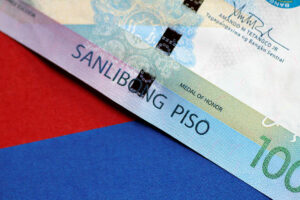By Aaron Michael C. Sy, Reporter
THE GOVERNMENT sold P300 billion worth of new 10-year fixed-rate Treasury notes (FXTN) amid strong demand for longer-dated tenors on expectations of rate cuts by the central bank.
“This inaugural public offering of the 10-year benchmark FXTNs is not only about raising funds – it’s about giving the market more ways to invest in their future and take part in the Republic’s programs and goals,” National Treasurer Sharon P. Almanza said in a statement late on Thursday.
The amount raised was 10 times the initial P30-billion offering as bids reached P307.05 billion.
This allowed the Bureau of the Treasury (BTr) to end the offer period on April 23, earlier than the planned April 24.
The BTr initially raised P135 billion from the new Treasury bonds (T-bonds) at its rate-setting auction on April 15 as tenders reached P197.3 billion.
The notes fetched a coupon rate of 6.375%, resulting in an average rate of 6.286%. Accepted bid yields ranged from 6% to 6.4%.
The notes, which will mature in 2035, will be listed on the Philippine Dealing & Exchange Corp. fixed income board on April 28.
“Despite ongoing global economic uncertainties, the success of the FXTN offering highlights
the strength of the domestic fixed-income market and investor confidence in government
securities as stable investment options,” the Treasury said.
“Additionally, by establishing liquid benchmarks, the BTr provides reference points for
price discovery and trading in the secondary market, bolstering liquidity and facilitating more efficient capital mobilization,” it said.
The bonds were mainly targeted at institutional investors such as corporates, cooperatives, trust funds, retirement funds, and provident funds.
“This is a good strategy to lock in long term funding amid rising long term interest rates,” Reyes Tacandong & Co. Senior Adviser Jonathan L. Ravelas said in a Viber message.
Development Bank of the Philippines (DBP) and Land Bank of the Philippines (LANDBANK) were the joint lead issue managers, with BDO Capital & Investment Corp., BPI Capital Corp., China Bank Capital Corp., First Metro Investment Corp., PNB Capital and Investment Corp., and Security Bank Capital Investment Corp. as joint issue managers.
“Demand was strong because the (Bangko Sentral ng Pilipinas) is looking for more rate cuts for the year given benign inflation,” a trader said by phone interview.
The Monetary Board resumed its easing cycle last month, lowering the target reverse repurchase rate by 25 basis points (bps) to 5.5%.
BSP Governor Eli M. Remolona, Jr. has said expectations of easing inflation support the shift to a more accommodative monetary policy stance, adding that they are considering further rate cuts this year.
The trader added that demand for T-bonds in the coming auctions will remain strong due to the BSP’s outlook.
The high amount raised for the T-bonds will help the government hedge its funding requirements against market volatility stemming from the Trump administration’s tariffs, Rizal Commercial Banking Corp. Chief Economist Michael L. Ricafort said in a Viber message.
“Foreign commercial borrowings are almost done already at $3.29 billion, which was raised in the latter part of January 2025 out of the $3.5 billion programmed for the year. So the priority now is the increase local borrowings in the total borrowing mix to reduce foreign exchange risks entailed in external/foreign borrowings,” he said.
For this year, the government plans to borrow P2.55 trillion comprised of P2.04 trillion from domestic borrowings and P507.41 billion from external borrowings.
The government borrows from local and foreign sources to help fund its budget deficit, which is capped at P1.54 trillion this year.
For 2025 to 2027, the NG plans to source at least 80% of its borrowing program from domestic sources, and 20% from foreign lenders.
